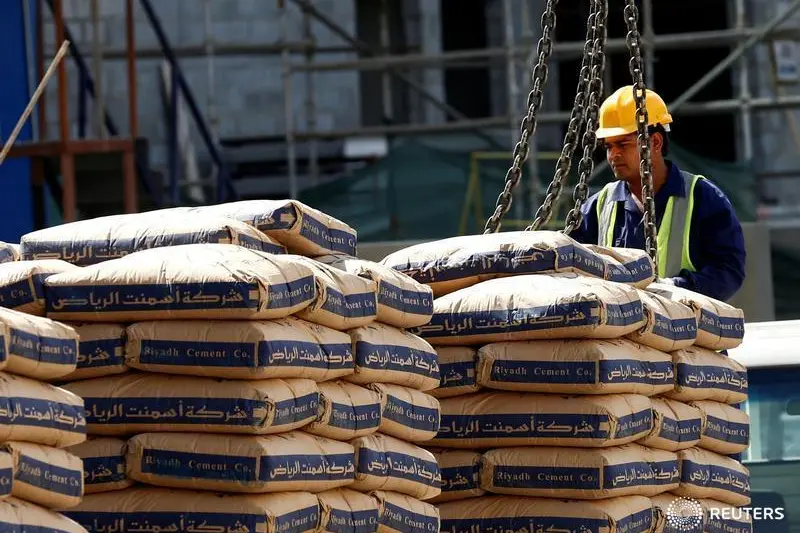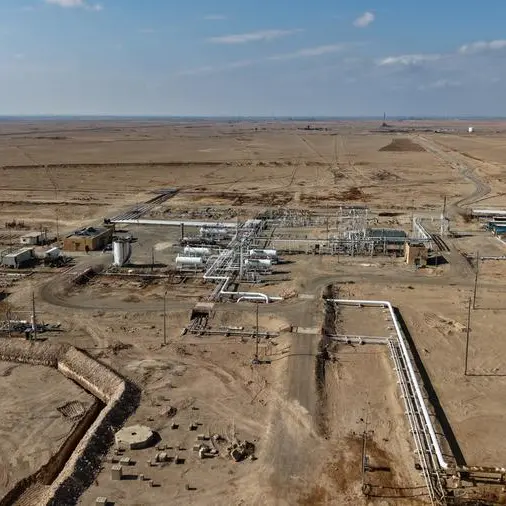PHOTO
BEIRUT (Thomson Reuters Foundation) - In the United Arab Emirates and some other sweltering parts of the Middle East, summer temperatures can hit 45 degrees Celsius, with brutal humidity making conditions feel even hotter.
Such heat can make working nearly unbearable - or even deadly - for the Gulf's legions of migrant construction workers.
But simple cooling vests, tweaked for use in the region by a University of Toronto student, could help save lives as climate change brings increasing summer heat.
"I wanted something that was feasible for construction firms to implement, that was low-cost and that would offer the preventative protection that we wanted for workers," said Adam Sheikh, 20, the founder of aegis, a non-profit that is introducing the cooling vests in the Gulf.
The vests are submerged in cool water for about a minute, then gently squeezed to wring out excess liquid. Once on a worker's body they act like a sponge, providing cooling for hours as the water slowly evaporates, Sheikh said.
An early version of the vests was tested in Qatar last year and this summer in Dubai by global contractor Multiplex, which has 200 of its workers wearing them.
Company officials say finding a way to keep workers cool enough is a problem.
"For this region, it's a geographical challenge for us to manage heat stress," Stephen Smith, executive director of safety at Multiplex, told the Thomson Reuters foundation from Dubai.
But after using the vests for about three months this summer, most of the workers reported feeling cooler and having more energy, Smith said.
One of them, Lijo Stephen, 26, sweats less and has "noticed the cooling effect" on his body, the company quoted him as saying in a statement.
On-site nurses are tracking blood pressure, heart rates and other measurements among the workers, as well as gathering feedback from them.
WORKERS AT RISK
Millions of migrant workers in the Gulf come from Asian countries such as Pakistan, India, the Philippines, Bangladesh and Nepal.
Migrants in the six Gulf States account for more than 10 percent of all migrants globally, while Saudi Arabia and the United Arab Emirates host the fourth and fifth largest migrant populations in the world respectively, according to the International Labour Organization's most recent figures.
As hotter weather surges around the world as a result of climate change, some countries are trying to adapt workdays and put in place other protection for workers.
Qatar, for instance, enforces a ban on outdoor work for several hours a day during the hottest months of the year.
But migrant workers have complained that heat exhaustion and dehydration are a significant risk while working in summer heat.
urn:newsml:reuters.com:*:nL5N1EG2RU
Sheikh, who comes from a family with Pakistani origins, said the migrants' plight in the face of worsening heat extremes drove him to look for a practical way to help.
"It really resonated with me," said Sheikh, a third year university student who has spent time in the Gulf and who has some family living there.
To find a solution, Sheikh teamed up with INUTEQ, a Netherlands-based manufacturer that specialises in evaporative cooling products for people exposed to extreme heat, such as firefighters, athletes and military personnel.
He is now adapting the water-absorbing vests already sold by INUTEQ and used in the trials in Qatar and Dubai to try to make them last up to six hours rather than three, to more effectively suit Gulf construction workers. He also is adding reflective strips for safety.
If significant orders come in, the vests can be sold for about $20 each, Sheikh said.
"You see it translate from just a comfort-based tool to a life-saving workplace tool - and that's what we were trying to do," Sheikh told the Thomson Reuters Foundation.
OTHER SAFETY MEASURES
Similar types of cooling technology already exist in the region, with Dubai in August issuing street cleaners with gel-filled "cooling collars" that fasten around the neck and act like cold compresses.
Qatar researchers also have created cooling hats with built-in fans for construction workers.
While the aim of all the technologies is the same - to fight against the risks of heat stroke and other heat-related health threats - Sheikh believes such equipment amounts to a "band-aid" fix for a bigger problem.
Temperatures in the Gulf are expected to become "intolerable" for humans by the end of the century if climate change is not addressed, a 2015 Nature Climate Change study showed.
Keeping workers safe in fast-rising heat may at some point no longer be possible, experts warn.
"Technology in isolation is not enough - it has to be used with other safety measures," said Smith, whose construction firm also provides Gulf workers with heat-beating help such as air-conditioned stations, mid-day breaks, electrolyte drinks and ice boxes.
Sheikh hopes the cooling vests will be adopted by more contractors in the Gulf - at least until researchers develop more sophisticated ways to protect people from heat.
"It is meant to be around... until something better comes along," he said.
(Reporting by Heba Kanso @hebakanso, Editing by Laurie Goering and Megan Rowling; Please credit Thomson Reuters Foundation, the charitable arm of Thomson Reuters, that covers humanitarian news, climate change, women's rights, property rights, and trafficking. ((Heba.Kanso@thomsonreuters.com;))
Such heat can make working nearly unbearable - or even deadly - for the Gulf's legions of migrant construction workers.
But simple cooling vests, tweaked for use in the region by a University of Toronto student, could help save lives as climate change brings increasing summer heat.
"I wanted something that was feasible for construction firms to implement, that was low-cost and that would offer the preventative protection that we wanted for workers," said Adam Sheikh, 20, the founder of aegis, a non-profit that is introducing the cooling vests in the Gulf.
The vests are submerged in cool water for about a minute, then gently squeezed to wring out excess liquid. Once on a worker's body they act like a sponge, providing cooling for hours as the water slowly evaporates, Sheikh said.
An early version of the vests was tested in Qatar last year and this summer in Dubai by global contractor Multiplex, which has 200 of its workers wearing them.
Company officials say finding a way to keep workers cool enough is a problem.
"For this region, it's a geographical challenge for us to manage heat stress," Stephen Smith, executive director of safety at Multiplex, told the Thomson Reuters foundation from Dubai.
But after using the vests for about three months this summer, most of the workers reported feeling cooler and having more energy, Smith said.
One of them, Lijo Stephen, 26, sweats less and has "noticed the cooling effect" on his body, the company quoted him as saying in a statement.
On-site nurses are tracking blood pressure, heart rates and other measurements among the workers, as well as gathering feedback from them.
WORKERS AT RISK
Millions of migrant workers in the Gulf come from Asian countries such as Pakistan, India, the Philippines, Bangladesh and Nepal.
Migrants in the six Gulf States account for more than 10 percent of all migrants globally, while Saudi Arabia and the United Arab Emirates host the fourth and fifth largest migrant populations in the world respectively, according to the International Labour Organization's most recent figures.
As hotter weather surges around the world as a result of climate change, some countries are trying to adapt workdays and put in place other protection for workers.
Qatar, for instance, enforces a ban on outdoor work for several hours a day during the hottest months of the year.
But migrant workers have complained that heat exhaustion and dehydration are a significant risk while working in summer heat.
Sheikh, who comes from a family with Pakistani origins, said the migrants' plight in the face of worsening heat extremes drove him to look for a practical way to help.
"It really resonated with me," said Sheikh, a third year university student who has spent time in the Gulf and who has some family living there.
To find a solution, Sheikh teamed up with INUTEQ, a Netherlands-based manufacturer that specialises in evaporative cooling products for people exposed to extreme heat, such as firefighters, athletes and military personnel.
He is now adapting the water-absorbing vests already sold by INUTEQ and used in the trials in Qatar and Dubai to try to make them last up to six hours rather than three, to more effectively suit Gulf construction workers. He also is adding reflective strips for safety.
If significant orders come in, the vests can be sold for about $20 each, Sheikh said.
"You see it translate from just a comfort-based tool to a life-saving workplace tool - and that's what we were trying to do," Sheikh told the Thomson Reuters Foundation.
OTHER SAFETY MEASURES
Similar types of cooling technology already exist in the region, with Dubai in August issuing street cleaners with gel-filled "cooling collars" that fasten around the neck and act like cold compresses.
Qatar researchers also have created cooling hats with built-in fans for construction workers.
While the aim of all the technologies is the same - to fight against the risks of heat stroke and other heat-related health threats - Sheikh believes such equipment amounts to a "band-aid" fix for a bigger problem.
Temperatures in the Gulf are expected to become "intolerable" for humans by the end of the century if climate change is not addressed, a 2015 Nature Climate Change study showed.
Keeping workers safe in fast-rising heat may at some point no longer be possible, experts warn.
"Technology in isolation is not enough - it has to be used with other safety measures," said Smith, whose construction firm also provides Gulf workers with heat-beating help such as air-conditioned stations, mid-day breaks, electrolyte drinks and ice boxes.
Sheikh hopes the cooling vests will be adopted by more contractors in the Gulf - at least until researchers develop more sophisticated ways to protect people from heat.
"It is meant to be around... until something better comes along," he said.
(Reporting by Heba Kanso @hebakanso, Editing by Laurie Goering and Megan Rowling; Please credit Thomson Reuters Foundation, the charitable arm of Thomson Reuters, that covers humanitarian news, climate change, women's rights, property rights, and trafficking. ((Heba.Kanso@thomsonreuters.com;))





















